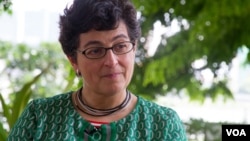[Editor’s Note: Last week, Cambodia hosted the World Economic Forum on ASEAN in Phnom Penh, bringing hundreds of senior decision-makers in trade, business, and commerce. The forum covered entrepreneurship, the ‘digital revolution’, cross-border trade, and governance for greater collaboration between industry, government and civil society. On the sidelines of the event, VOA Khmer’s Hean Socheata and Khan Sokummono spoke to Arancha Gonzalez, executive director of the International Trade Center, about the future of Cambodian trade.]
VOA: Early this year, you met with the Minister of Commerce, and you also supported Cambodia in conducting impact analysis in the garment sector. Why do you think it’s important?
Arancha Gonzalez: Well the beginning of this year, the Minister of Commerce Pan Sorasak told me that the United States was increasing its preferences that it offers to Cambodia. Therefore, he wanted to explore together with ITC that we’re looking to how to tap into the additional type of line that the US is offering great markets to Cambodia. He also wanted to understand a little bit better where is the export potential for Cambodia. The products that Cambodia already exported, you know that the current trade by Cambodia is very concentrated into E.U. and U.S. markets, where it’s very concentrated in the textile and clothing sector is one. And therefore the second question you have for us was to start looking at supporting identification of Cambodian trade, which also has a lot of potential compared to disadvantages in juices and fruits and vegetables.
VOA: So what are the elements of the impact analysis?
Arancha Gonzalez: So it was not an analysis of what textile and clothing and how it impacts the economics of Cambodia. It was more looking at how can Cambodia open up new opportunities for more small and medium enterprises. And it’s also a very interesting conversation which I had with Prime Minister [Hun Sen] at the World Economic Forum. The bulk of companies in Cambodia are small and medium enterprises. But the bulk of the companies don’t export, they are very limited to the domestic market and the domestic market is 15 million Cambodians, but that is not a lot, so the question that Cambodia has to ask itself is where else could Cambodia diversify. And of course, we know that traditionally the country has exported clothing, but they are other sectors, like services for example, like digital services, and like tourism services. Tourism has increasing potential in Cambodia, so the question is how can we help the country grab better opportunities for small and medium entrepreneurship.
VOA: You also agreed to draft the proposal in order to obtain more aid for the implementation for Trade Facilitation Agreement (TFA), could you tell us about the proposal?
Arancha Gonzalez: So WTO has agreed to simplify its customs procedure of each member. That’s what we call the Trade Facilitation Agreement. It is an agreement to reduce somewhere between 10 to 15 percent because of moving goods through borders. It has to do with automatizing customs. We export only one place to go to do all of purpose procedure. Unlike previous WTO agreements, this style is very understood among WTO members that the countries that have difficulties in implementing this agreement by themselves will get necessarily technical and financial assistance to implement this agreement. This is why we have been working with Cambodia to help Cambodia. We have experts in customs issues that come here and are sitting with the government to help them do some of these reforms. It’s not billions. Sometimes it’s not even millions. Sometimes it’s hundreds of thousands. For example, having an online portal, having an online single window for which you would do for your custom’s procedure. They are good investments because at the end of the day they will immediately result in benefits in terms of low cost for small and medium enterprises to export.
VOA: What do you think about the free and fair trade in Cambodia, particularly in the garment sector?
Arancha Gonzalez: I don’t generally like to talk about free trade. I like to talk about open trade because free seems to imply that we agree that it has to be without any rules and without any exceptions. And I don’t think that it’s without any rules and without any exceptions. I think trade has to be more open. There have to be less barriers, have to be less costs, but there should be safeguards to make sure that trade is a safe and sound product and that it’s not a poisonous product that has to be a minimum of rules, this is why I prefer to talk about open trade. There’s also in the meantime a great opening of trade in textiles and clothing by other developing countries like China, India, Turkey, Chile and all of these help Cambodia. Now the only problem is that traditionally Cambodia’s exports have been very much directly to the EU and the US market because this is where the investment came regionally to set up production facilities in Cambodia. I think it is time to start looking at the opportunity for diversification.
VOA: So what is the mechanism that the WTO and ITC would suggest Cambodia adopt to ensure transparency?
Arancha Gonzalez: I think it’s the question of mapping where the opportunities are and very decisively moving into tackling those markets. You see it’s very comfortable to remain in the market that you know, in the sector that you know, but you need to look into diversification. It’s also good that you don’t put all your eggs in one basket. You put all your different eggs in different baskets. If anything happens in one country, you can go to other countries that can provide the potential. So first I would say take domestic measures to bring your producers to other foreign markets.
This interview has been edited for length and clarity.




